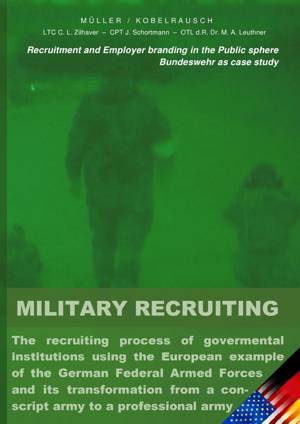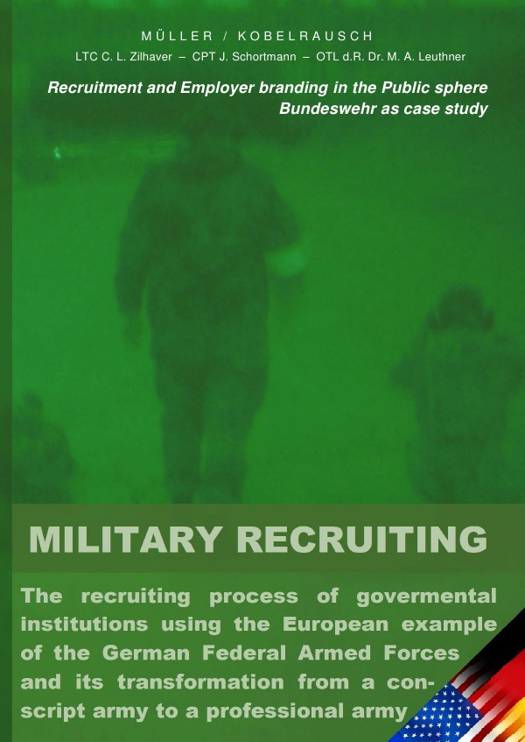
- Afhalen na 1 uur in een winkel met voorraad
- Gratis thuislevering in België vanaf € 30
- Ruim aanbod met 7 miljoen producten
- Afhalen na 1 uur in een winkel met voorraad
- Gratis thuislevering in België vanaf € 30
- Ruim aanbod met 7 miljoen producten
Zoeken
MILITARY RECRUITING
The recruiting process of governmental institutions using the European example of the German Federal Armed Forces and its transformation from a conscript army to a professional army (Recruitment and Employer branding in the Public sphere)
Markus Müller
Paperback | Engels
€ 38,45
+ 76 punten
Uitvoering
Omschrijving
The study on "Military Recruiting" explores the complexities of military recruitment and presents them in a global economic science context. It is not only a primary scientific study on employer attractiveness of state institutions on the example of the German Federal Armed Forces, offering a comparison with other European armies and the US military, but covers the theme of employer branding from work-life balance to global economic aspects. For the implementation of the results the two levels of internal and external influencing factors that affect the choice of the employer were determined: "instrumental dimension (objective (pre-)knowledge)" and "symbolic dimension (subjective emotions)".
A particular intention of this work is to show how scientific research in civil-military context and civilian use may not only complement each other but also constitute an interdependent benefit extension. The core study covers not only "The attractiveness of the Bundeswehr as an employer in the light of the public good problem" and the recruitment in the military context, but also recruiting in general. Under this approach the Bundeswehr is exemplified as a state institution in the research focus of the recruitment of public employers. The analytic approach, the found correlations and implications may serve as a basis for public employers and government as well as for private companies. For this purpose, individual topics were embedded as self-contained subject areas (see Table of Contents and List of Figures) in the overall context. Beyond that, general government and policy-making aspects such as the problem of provision of public goods and geopolitical issues like the establishment of global public goods has been addressed with the understanding of the attached security concerns to sufficient degree.
A particular intention of this work is to show how scientific research in civil-military context and civilian use may not only complement each other but also constitute an interdependent benefit extension. The core study covers not only "The attractiveness of the Bundeswehr as an employer in the light of the public good problem" and the recruitment in the military context, but also recruiting in general. Under this approach the Bundeswehr is exemplified as a state institution in the research focus of the recruitment of public employers. The analytic approach, the found correlations and implications may serve as a basis for public employers and government as well as for private companies. For this purpose, individual topics were embedded as self-contained subject areas (see Table of Contents and List of Figures) in the overall context. Beyond that, general government and policy-making aspects such as the problem of provision of public goods and geopolitical issues like the establishment of global public goods has been addressed with the understanding of the attached security concerns to sufficient degree.
Specificaties
Betrokkenen
- Auteur(s):
- Uitgeverij:
Inhoud
- Aantal bladzijden:
- 96
- Taal:
- Engels
Eigenschappen
- Productcode (EAN):
- 9783737579339
- Uitvoering:
- Paperback
- Afmetingen:
- 170 mm x 240 mm
- Gewicht:
- 176 g

Alleen bij Standaard Boekhandel
+ 76 punten op je klantenkaart van Standaard Boekhandel
Beoordelingen
We publiceren alleen reviews die voldoen aan de voorwaarden voor reviews. Bekijk onze voorwaarden voor reviews.








